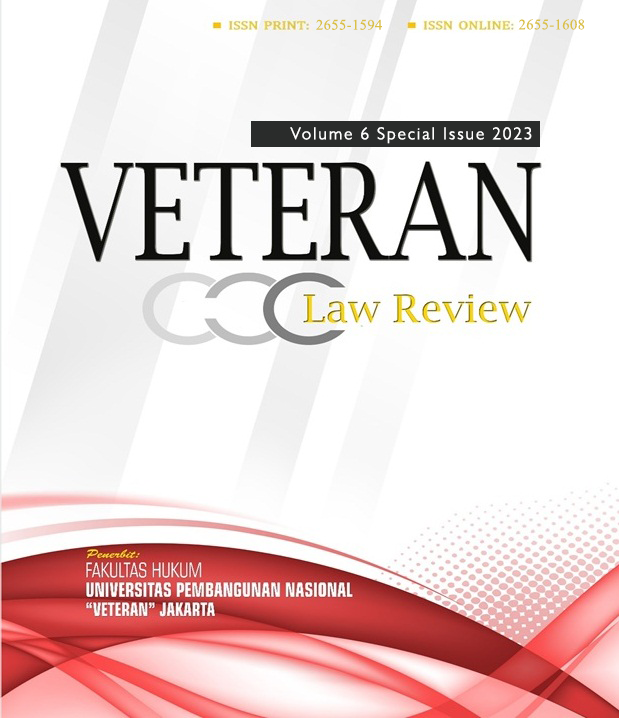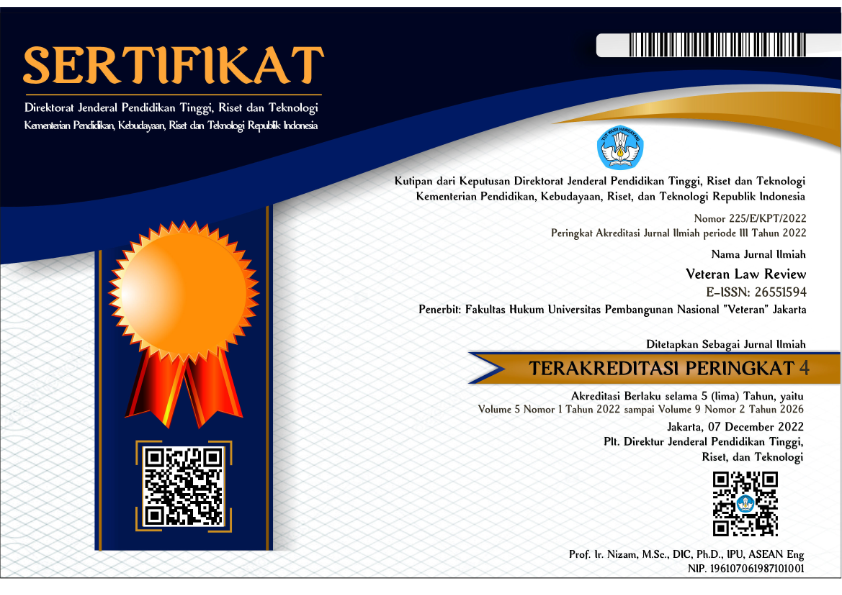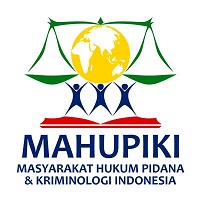Legal Interpretation of Regulation Law No. 2 of 2012 Concerning Land Acquisition for Development in The Public Interest
DOI:
https://doi.org/10.35586/velrev.v6iSpecialIssues.5761Keywords:
Legal Interpretation; Land Acquisition; Public Interest.Abstract
Law No. 2 of 2012 concerning Land Acquisition for Development in the Public Interest (Land Acquisition Law) has been a guideline for the government in conducting land acquisition for more or less 10 years. In the Land Acquisition Law, land allotment for development in the public interest does not include mining as a part of development in the public interest This research aims to analyze and understand the Legal Interpretation of Regulation Law No. 2 of 2012 Concerning Land Acquisition for Development in The Public Interest. The method of this research is library research as a research in literature or an activity to compile information relevant to topic or object of research and received from books, scientific paper, thesis, dissertation, encyclopedia, internet and other resources. The research shows the result is To ensure the availability of land for public interest by taking into account the balance between the interests of development and the interests of the community.
Downloads
References
Amirudin & H. Zainal Asikin. (2006). Pengantar Metode Penelitian Hukum. Jakarta: PT RajaGrafindo Persada. 118.
Arif, Muhammad Fatkhul. (2016). Makna Kepentingan Umum Dalam Pengadaan Tanah Untuk Jalan Tol Dalam Perspektif Undang-Undang Nomor 2 Tahun 2012 Tentang Pengadaan Tanah Bagi Pembangunan Untuk Kepentingan Umum. Kolisch. 49–56.
B. Arief Sidharta. (2005). Dalam kata pengantar, Jazim Hamidi. Hermeneutika Hukum, Cet. I. Yogyakarta : UII Press. 53-57.
Bintan R. Saragih. (2006). Politik Hukum. Bandung: Utomo. 18.
Dirkareshza, R., Ardiantor, A., & Pradana, R. (2021). Penafsiran Hukum (Legal Interpretations) Terhadap Undang-Undang Nomor 25 Tahun 2009 Tentang Pelayanan Publik Demi Masyarakat Yang Sejahtera, Adil, dan Makmur (Walfare State)(Standpoint Usul Perubahan Terhadap UU Pelayanan Publik). Reformasi Hukum, 25(2), 127-146.
Dirkareshza, R., Ibrahim, A. L., & Ardianto, A. (2021). Antinomi Regulations on the Recognition and Enforcement of Ulayat Right from Indigenous Peoples. International Journal of Social Science And Human Research, 4, 596-602.
Imam Syaukani, dan A. Amin Ahsin Thohari. (2010). Dasar-Dasar Politik Hukum Islam. Jakarta: RajaGrafindo Persada. 07.
Jimly Asshidiqie. (1997). Teori & Aliran Penafsiran Hukum Tata Negara, Cet. I. Jakarta: Ind. Hill Co. 17-18.
Kumba Digdowiseiso. (2019). Teori Pembangunan. Jakarta: Lembaga Penerbitan Universitas Nasional (LPU-UNAS).
Lexi J. Moleong. (1991). Metodologi Penelitian Kualitatif. Bandung: Rosyda Karya. 4.
Ph. Vissert Hoft. (2001). Penemuan Hukum, judul asli Rechtsvinding, diterjemahkan oleh B. Arief Sidharta. Bandung: Laboratorium Hukum FH Univ. Parahiayangan. 25.
Masyrullahushomad, Sudrajat. (2019). Penerapan Agrarische Wet ( Undang-Undang Agraia ) 1870 : Periode Awal. Historia: Jurnal Program Studi Pendidikan Sejarah, 7.(2)159–74.
Moh. Mahfud MD. (2014). Politik Hukum Di Indonesia. Jurnal Pendidikan Agama Islam-Ta’lim.
Rambi, Raegen Mic Arthur. (2016). Kedudukan Dan Fungsi Naskah Akademik Dalam Pembentukan Peraturan Daerah Kabupaten/Kota Menurut UU No. 12 Tahun 2011. Https://Medium.Com/, V.4, 22–30 <https://medium.com/@arifwicaksanaa/pengertian-use-case-a7e576e1b6bf>.
Sayuti. (2013). Arah Kebijakan Pembentukan Hukum Kedepan (Pendekatan Teori Hukum Pembangunan, Teori Hukum Progresif, Dan Teori Hukum Integratif). Arrisalah. 13(2), 1–22.
Utami, Westi dan Sarjita. (2021). Pengadaan Tanah Di Indonesia Dan Beberapa Negara Dari Masa Ke Masa. Daerah Istimewa Yogyakarta: STPN Press. 19.
Undang-Undang No. 12 Tahun 2011 Tentang Pembentukan Peraturan Perundang-undangan (Lembaran Negara Republik Indonesia Tahun 2011 Nomor 82, Tambahan Lembaran Negara Republik Indonesia Nomor 5234).
Undang-Undang No. 2 Tahun 2012 Tentang Pengadaan Tanah Bagi Pembangunan Untuk Kepentingan Umum (Lembaran Negara Republik Indonesia Tahun 2012 Nomor 22, Tambahan Lembaran Negara Republik Indonesia Nomor 5280).
Undang-Undang No. 11 Tahun 2020 tentang Cipta Kerja (Lembaran Negara Republik Indonesia Tahun 2020 Nomor 245, Tambahan Lembaran Negara Republik Indonesia Nomor 6573).
http://etheses.uin-malang.ac.id/1398/7/08210045_Bab_3.pdf. Retrived November 9 2022, 14.21 WIB. 84.
Downloads
Published
How to Cite
Issue
Section
License
Copyright (c) 2023 Veteran Law Review

This work is licensed under a Creative Commons Attribution-ShareAlike 4.0 International License.
Copyright (c) 2022 Veteran Law Review Journal
Veteran Law Review © 2022 by Faculty of Law Universitas Pembangunan Nasional "Veteran" Jakarta is licensed under Creative Commons Attribution 4.0 International

1. License
The non-commercial use of the article will be governed by the Creative Commons Attribution license as currently displayed on Creative Commons Attribution 4.0 International.
2. Author(s)' Warranties
The author warrants that the article is original, written by the stated author(s), has not been published before, contains no unlawful statements, does not infringe the rights of others, is subject to copyright that is vested exclusively in the author, and free of any third party rights, and that any necessary written permissions to quote from other sources have been obtained by the author(s).
3. User/Public Rights
VELREV's spirit is to disseminate articles published are as free as possible. Under the Creative Commons Attribution-ShareAlike 4.0 International License. VELREV permits users to copy, distribute, display, and perform the work for non-commercial purposes only. Users will also need to attribute authors and VELREV to distributing works in the journal and other media of publications.
4. Rights of Authors
Authors retain all their rights to the published works, such as (but not limited to) the following rights;
- Reproduce the work
- Prepare derivative works based upon the work
- Distribute copies of the work
- Perform the work publicly
- Display the work publicly
- Copyright and other proprietary rights relating to the article, such as patent rights,
- The right to self-archive the article,
- The right to enter into separate, additional contractual arrangements for the non-exclusive distribution of the article's published version (e.g., post it to an institutional repository or publish it in a book), with an acknowledgement of its initial publication in this journal (Veteran Law Review).
5. Co-Authorship
If the article was jointly prepared by more than one author, any author submitting the manuscript warrants that he/she has been authorized by all co-authors to be agreed on this copyright and license notice (agreement) on their behalf, and agrees to inform his/her co-authors of the terms of this policy. VELREV will not be held liable for anything that may arise due to the author's internal dispute. VELREV will only communicate with the corresponding author.
6. Royalties
Being an open accessed journal and disseminating articles for free under the Creative Commons license term mentioned, author(s) are aware that VELREV entitles the author(s) to no royalties or other fees.
7. Miscellaneous
VELREV will publish the article (or have it published) in the journal if the article’s editorial process is successfully completed. JOSI's editors may modify the article to a style of punctuation, spelling, capitalization, referencing, and usage that deems appropriate. The author acknowledges that the article may be published so that it will be publicly accessible and such access will be free of charge for the readers as mentioned in point 3.


















